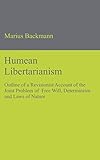Humean Libertarianism / Marius Backmann.
Material type: TextPublisher: Berlin ; Boston : De Gruyter, [2013]Copyright date: ©2013Description: 1 online resourceContent type:
TextPublisher: Berlin ; Boston : De Gruyter, [2013]Copyright date: ©2013Description: 1 online resourceContent type: - 9783110320503
- 9783110320701
- online - DeGruyter
| Item type | Current library | Call number | URL | Status | Notes | Barcode | |
|---|---|---|---|---|---|---|---|
 eBook
eBook
|
Biblioteca "Angelicum" Pont. Univ. S.Tommaso d'Aquino Nuvola online | online - DeGruyter (Browse shelf(Opens below)) | Online access | Not for loan (Accesso limitato) | Accesso per gli utenti autorizzati / Access for authorized users | (dgr)9783110320701 |
Frontmatter -- CONTENTS -- ACKNOWLEDGMENTS -- INTRODUCTION -- 1 DETERMINISM -- 2 NECESSITY AND LAWS OF NATURE -- 3 LIBERTARIANISM -- 4 OBJECTIONS AGAINST EVENT-CAUSAL LIBERTARIANISM -- 5 HUMEAN LIBERTARIANISM: FORTES, FOIBLES, AND FUTURE FOLLIES -- REFERENCES
restricted access online access with authorization star
http://purl.org/coar/access_right/c_16ec
What does it mean for an agent to be free? Is determinism true? What are laws of nature? This book deals with the interconnections between these questions. Backmann argues for the view that libertarianism can be reconciled with determinism. In order to reach this goal, libertarianism - classically defined as an incompatibilist theory of free will - is defined as the thesis that at the time of decision, the agent must be able to choose between alternative courses of action. Backmann claims that this notion of libertarianism can be reconciled with determinism provided that determinism is understood in a Humean fashion, i.e. backed by a Humean theory of laws of nature. The resulting view - Humean Libertarianism - is an intermediate position between classical compatibilism and incompatibilism.
Mode of access: Internet via World Wide Web.
In English.
Description based on online resource; title from PDF title page (publisher's Web site, viewed 08. Jul 2019)


